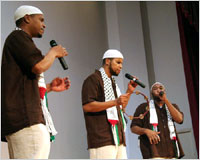US State Dept promotes Muslim hip-hop group
Your tax dollars at work...from a State Department website.
While I didn't see anything explicitly offensive in the lyrics, it is clear that the "tolerance" mentioned is only teaching others tolerance for Islam, not teaching Muslims tolerance for other religions or ways of life. In many ways the lyrics are proselytizing, which is a questionable activity for the State Department to be promoting:Muslim-American Rappers Promote Tolerance in Middle East
Native Deen hip-hop group energizes Palestinian youth in Jerusalem
By Carolee Walker
USINFO Staff WriterWashington – When Native Deen took hip-hop music to Jerusalem in fall 2006, the group of Muslim-American rappers was moved deeply by the holiness of the place and the energy of the hundreds of teens who attended their concerts. Yet nothing came close to the connection the performers felt to their faith during their Middle East trip.Muslim-American rappers Abdul Malik, Joshua Salaam and Naeem Muhammad of Native Deen perform in Jerusalem. (photo: Native Deen)
“I could feel it in the stone and the rocks,” said Naeem Muhammad of Native Deen, a Muslim-American hip-hop group based near Washington that has a strong following in the United Kingdom and the United States.
“Our music inspires Muslims to be better Muslims, but it also gives other people a better view of our faith,” Joshua Salaam told USINFO in an interview.The rhythm is there, and the beat is contemporary. But the heart of inspirational hip-hop music is in the powerful rap lyrics coaxing listeners to live better lives and be better people.
Native Deen traveled to Turkey, Dubai, the Palestinian Territories and Israel on behalf of the U.S. Department of State, incorporating the teachings of Islam into songs about respect and humanity. At all the concerts, the performers were greeted like “American superstars,” they said. In Dubai, Native Deen won the 2006 Mahabba Award at an event showcasing musicians, artists and filmmakers inspired to spread Islam through art.The group, founded in 2000, is known for its positive energy, use of traditional percussion and lyrics focused on tolerance and the teachings of Islam.
“We use the Quran as a source of guidance for us when we write our songs,” said Abdul Malik. “We use the morals and guidelines that we find in the Quran to teach people and to guide people.” This means that the beat, or rhythm, comes second, according to Salaam. The lyrics are the most important aspect of the song, so in Native Deen’s sound, the rap is always in front of the percussion.
“Deen” is the Arabic word for “religion,” or way of life.
He (satan) wants to bring you down, he whispers everyday
You started on the path and he led you astray
I know you will come back, you never feel at peace
You're searching for the truth to put your mind at ease
You know you're missing me, I know what you've been through
When we meet again, we have a lot of work to doI am the Deen you know
I am the Deen you need
I am the Deen you love
Please come back to meYour life had just begun, I helped to raise you up
You thought it'd be easy but your life turned out to be rough
You thought I let you down, I never let you go
I'm worried ‘cause you left me and you didn't even know
You know you're gonna die, who knows when that will be
Before you meet Allah you should come back to meI am the Deen you know
I am the Deen you need
I am the Deen you love
Please come back to mePeople coming back, People coming back To Islam, people are coming to this Deen
To Islam, you are invited to this Deen
The leader of the band has a blog where he tries hard not to publicize his true feelings:
We are in Palestine now. I will have to keep this blog short before I start to get heated and make some political statements that will get Native Deen arrested.
All in all, this is something that raises questions about what exactly the State Department is intending with this sponsorship.
- Islam Is Fragile
One of my recent pieces at Jihad Watch was about a new Orwellian-named government unit here in Malaysia, namely something called a 'Faith Rescue Unit'. After the Malaysian authorities learned that there was a handful of Muslims (11 out of more...
- Uk: Islamists Contibue Receiving Secretly Funding In Tower Hamlets
Very disturbing things are going on at Tower Hamlets, the east London council which has fallen under the influence of an Islamic supremacist group, the Islamic Forum of Europe, based at the hardline East London Mosque. The Labour council leader, Lutfur...
- American Muslims Vs. The U.s. Military
From Joe Kaufman at Front Page Magazine: Are American Muslims allowed to fight for the United States in a time of war? According to many Muslims within the Islamic world, the answer is emphatically "No." While one can easily understand how this rhetoric...
- If Nasrallah Is More Popular, That's Their Problem
I hear all this whining about 'oh the jews made a mistake in their brusque disproportionate response' because now Nasrallah is more popular. Exsqueeze me my moronic little friends, but if we do NOTHING he becomes more popular and if we do something...
- Tension Erupts Between Fatah, Hamas In Gaza
From Yahoo News:GAZA (Reuters) - A bomb blew up outside the house of a senior Palestinian security commander in the Gaza Strip on Wednesday, increasing tensions between President Mahmoud Abbas's Fatah faction and the militant Islamic group Hamas.The...


